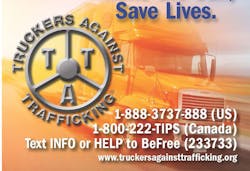Ohio truckers: See something, say something, save a life
Oct. 16, 2015
4 min read
In a few months, all new Ohio-licensed truckers will be enlisted in the fight against human trafficking.Beginning next year, every driver issued a CDL in Ohio will be provided a one-hour training program and given a Truckers Against Trafficking wallet card explaining what to look for and what to do when human trafficking is suspected. Ohio is the first state to make training mandatory although many carriers already offer anti-trafficking classes to current drivers.Kendis Paris, Executive Director and Co-Founder of Truckers Against Trafficking, says that while the program is mandatory for new Ohio-licensed drivers no existing drivers will be required to take the training. "This doesn't mean that the Ohio State Patrol hasn't been working with carriers to implement training, but in terms of actual requirements, this is at the entry level." She credits Captain Mike Crispen, Commander of Ohio's Commercial Motor Vehicle Enforcement Section, for championing the training efforts at the state government level. "He's an amazing guy, super passionate about this issue," she said. "We worked with him. I created a PowerPoint for him to help train CDL instructors, and he took that and added a few Ohio-specific slides."Crispen says that the Department of Public Safety of Ohio has the ability under law to set topics for annual meetings to discuss what should be taught in CDL training. "During one of our meetings, I was talking to one of the people who run the TAT program about wallet cards and training. [Several agencies] came together during this meeting and decided that human trafficking should be one of the topics."Ohio has been active in combating human trafficking through its commission on human trafficking task force… The governor takes this issue very seriously and so does the Attorney General's office," says CrispenAlthough anti-trafficking efforts sometimes focus on truckstops, Paris and Crispen are loathe to paint truckstops as unsavory places that are hotbeds of human trafficking. "Human trafficking is certainly a mobile crime. The highways go past truck stops, but the truck stops are no more responsible or any more of a spot of concern than, say, the corner is in some cities, for prostitution or anything of that nature. They're just locations of opportunity for criminals," says Crispen. "If we were to focus solely on truckstops, then we would lose the battle, so to speak, because we would not really be focused on where criminals would move from there."Paris adds: "This is a crime that comes to them [truckstops]. We don't ever want to make truck stops sound like seedy places or whatever. Traffickers are exploiting those victims and locations for criminal gain. TAT is fully in support of truck stops existing and truck stop expansion." She notes that some of the most ardent supporters of anti-trafficking efforts are truckstop owners and operators.Do these educational efforts pay off? TAT gave its Harriet Tubman award to Con-way driver Kevin Kimmel who in January pulled into a truckstop in Virginia and noticed suspicious activity around an RV. "He saw a young woman try to stick her head out the window, only to have it violently snapped back and a black curtain pulled in its place. He made a phone call that resulted in a state trooper coming out and separating the young woman from her captors, a man and a woman - a couple. She was from Iowa and they had coerced her into their RV eighteen days earlier. Over that period of time they were beating her, sexually abusing her, torturing her, all sorts of things." The couple also pimped her out, Paris said, and forced her to call her family and say that everything was okay. Paris notes that Kimmel had not seen TAT's materials first hand, but because Con-way had implemented the training for new drivers he was aware of the program and was sensitive about what to look for. "This just goes to show you that a truck driver in the right place at the right time, caring enough to do something, can save a life. I love what Kevin Kimmel said afterward. 'If you're wrong and you make a call, maybe you inconvenience somebody for about 15 minutes.' But he said, 'If you're right, you're saving a life.' And that's exactly what he did that day."
About the Author

Larry Kahaner
Larry Kahaner is an author, journalist, and former FleetOwner contributor.
Sign up for our eNewsletters
Get the latest news and updates
